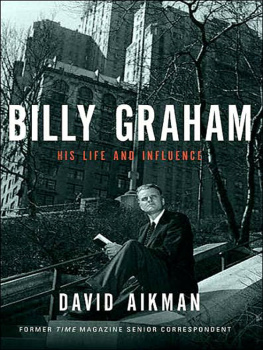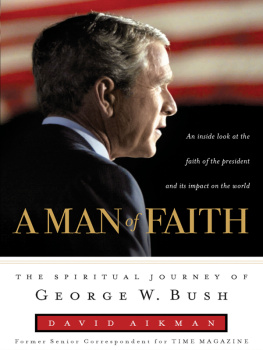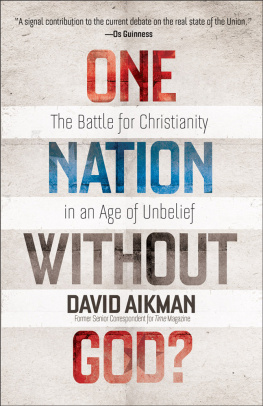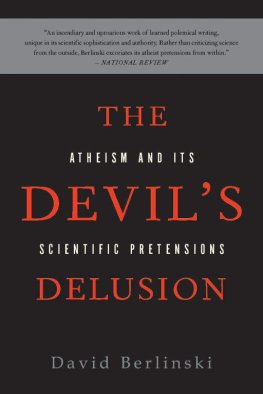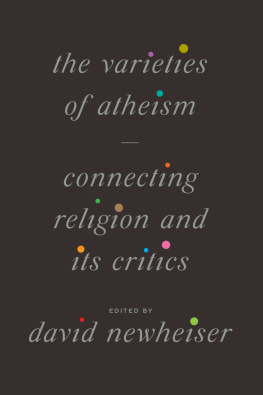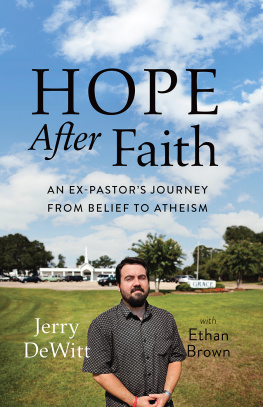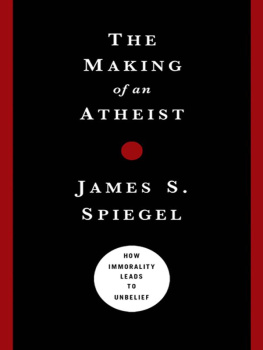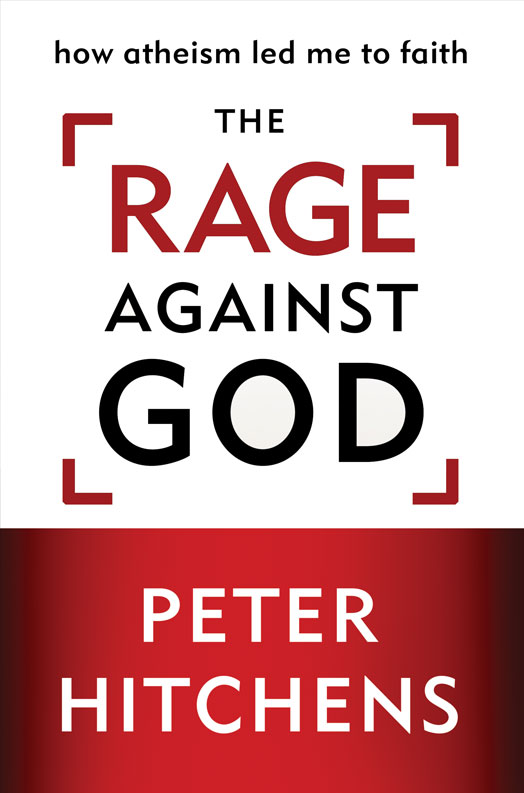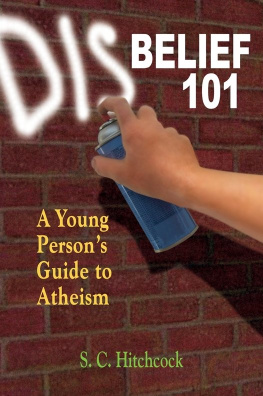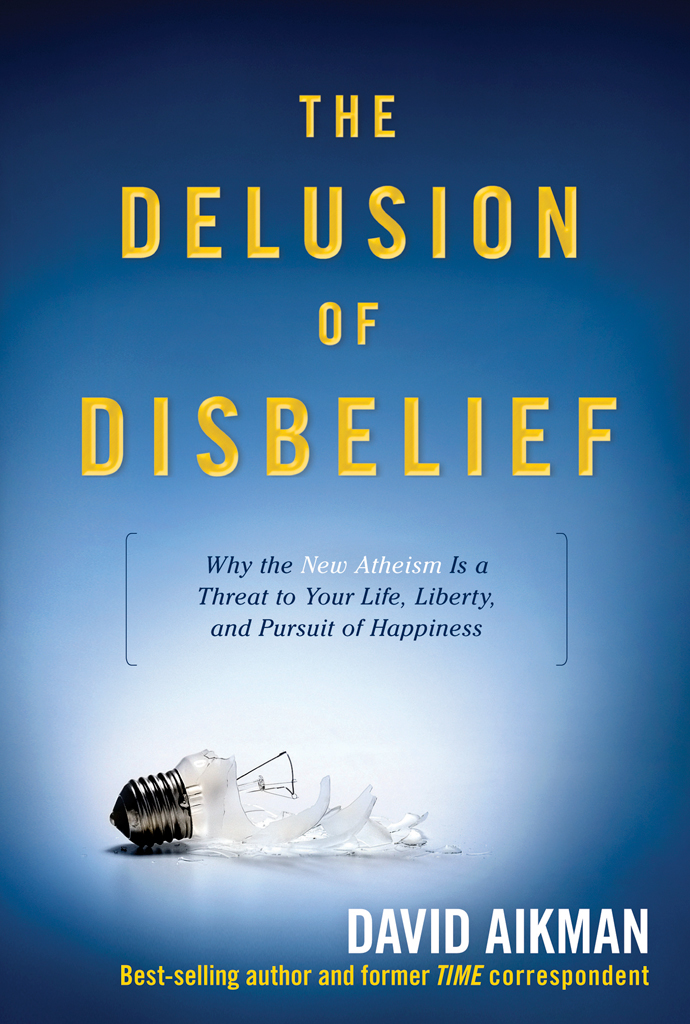This book is dedicated to my cherished, wonderful friend, who was loyal and helpful at a great personal cost.
Copyright 2008 by David Aikman. All rights reserved.
Cover photo copyright by Veer. All rights reserved.
Author photo copyright by Charla Thompson, Charla Photography. All rights reserved.
Designed by Erik M. Peterson
Published in association with the literary agency of Eames Literary Services, 4170 Hillsboro Rd., Suite 251, Nashville, TN 37215.
Unless otherwise indicated, all Scripture quotations are taken from the Holy Bible, New International Version. NIV. Copyright 1973, 1978, 1984 by International Bible Society. Used by permission of Zondervan. All rights reserved.
Aikman, David, date.
The delusion of disbelief : why the new atheism is a threat to your life, liberty, and pursuit of happiness / David Aikman.
p. cm.
Includes bibliographical references and index.
ISBN-13: 978-1-4143-1708-3 (hc)
ISBN-10: 1-4143-1708-5 (hc)
1. Atheism. I. Title.
BL2747.3.A35 2008
211.8 dc22 2007044539
Chapter One
THE
FOUR HORSEMEN
Ours is the first attempt in recorded history to build a culture upon the premise that God is dead.
Princeton theologian Paul Ramsey, in 1966
A great assault upon faith was launched in 2006 against unsuspecting Americans who attend church, go to synagogue, worship in mosques, pray in temples, or otherwise live lives in which religion plays an important role. In just over a half year, three books by atheists hit the bookstores. Each of these books in various ways attacks all religious belief in general and Christianity in particular. Letter to a Christian Nation, written by a doctoral candidate in neuroscience, Sam Harris, came out on September 19, just a day after the publication of The God Delusion by Richard Dawkins, a noted British ethologist, evolutionary biologist, and Oxford University professor. The third book, Breaking the Spell: Religion as a Natural Phenomenon, by Daniel Dennett, a Tufts University philosophy professor, was released earlier, in February 2006.
All were best sellers and by mid-2007, the print run for Breaking the Spell had reached 64,000. The God Delusion was at 500,000, and Letter to a Christian Nation was at 185,000. Both the Harris and the Dawkins books were also on Publishers Weeklys 2006 best seller list.
Meanwhile, as Americans of faith were still digesting this burst of atheistic book production, one of the most talented writers and journalists in America, Englishman (and newly naturalized U.S. citizen) Christopher Hitchens, was about to uncoil his own sling. God Is Not Great: How Religion Poisons Everything was published on May 1, 2007. It was certainly a brisk seller; when I tried to buy a copy at the Borders bookstore on L Street in Washington D.C. less than two weeks later, I was told that it was sold out and that the store was scrambling to get more. In just a months time, the book had debuted at the No. 1 slot on the New York Times best sellers list with sales of more than 58,000. By the third week of June, just seven weeks after God Is Not Greats release, 296,000 copies were in print, bringing the total copies in print of all four atheist titles to more than one million.
Harris, Dawkins, Dennett, and Hitchens the names resonate like stately Anglo-Saxon partners of a Virginia law firm
Richard Dawkins uses the less glowering literary reference The Four Musketeers on his own Web site ( But that might be unfair. It is enough to say that Dawkins and his allies have been referred to as the new Godless, the New Atheists, and fundamentalist atheists, among other sobriquets.
The publishing phenomenon that these authors triggered quickly spilled over into other forums all over the country, and even beyond American shores. National radio and television news talk shows pitted the authors in debates against evangelical Christians. The Internet quickly bristled with angry diatribes from both camps. Major secular and Christian magazines invited the authors and Christian leaders to defend their views. Book reviews cropped up in a surprising array of publications print and online, American and European, religious and secular, scientific and atheistic, general news and scholarly. Journalists from Germany to Australia trumpeted the news that America was experiencing a new rise of atheism. Even Chinas official national television network, CCTV, and a Chinese-language Christian magazine reported on the phenomenon, and some Christians on mainland China started circulating essays attacking the New Atheists.
Groups across the United States booked the authors to speak at venues ranging from a Unitarian church to the New York Public Library, as well as any number of college campuses. New videos showing one or another of the authors or some parody of them cropped up on YouTube just about every week. Dawkins wrote of one grueling day in Toronto when he was booked for five television interviews and one radio, all in one day beginning before breakfast.
It is true that atheists are enjoying a rare prominence in American society, where their numbers have always been small. In March 2007, Newsweek magazine reported the results of a poll in which people were asked, Are you an atheist? A mere 3 percent of respondents said they were atheists, while 96 percent said they were not and 1 percent answered dont know.
Atheists were also considered least likely to share the average Americans vision of America. In The God Delusion, Dawkins cites his own figures illustrating the isolation of atheists in America. He refers to a 1999 Gallup poll that asked Americans whether they would vote for an otherwise well-qualified person who was:
A woman 95 percent said they would.
A Roman Catholic 94 percent
A Jew 92 percent
An African American 92 percent
A Mormon 79 percent
A homosexual 79 percent
An atheist 49 percent
The last statistic in this list seems especially to have riled Dawkins. In The God Delusion, he speaks often of a need for consciousness-raising among atheists in America, and the His Web site has a social-networking section that serves as a platform for putting atheists from around the world in touch with each other.
In 2003, Dawkins and Dennett wrote a series of editorials trying to popularize a new nomenclature for atheists: the brights. Ostensibly, this was to provide atheists with their own version of gay pride and a sort of umbrella of respectability to protect atheists from the real or imagined prejudice of many Americans. Today, there is a brights Web site,
If the polls cited above and Dawkinss assertion of American intolerance of atheists are accurate, then we dims do indeed need to behave better. It is surely the mark of any civilized society that philosophical and political adversaries conduct discourse with respect and courtesy. As Catholic theologian and former U.S. ambassador Michael Novak has observed,


